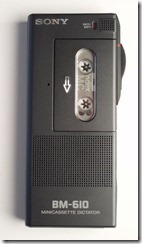Should You Tape Your Media Interviews?
Over the past decade, I’ve read far too many media training books, articles, and blogs. Although there’s a sameness to many of them, there’s one question media trainers seem to disagree on more than any other: Should you tape record your media interviews or not?
I’m not talking here about recording the program on which your interview airs, but rather whether you should record the actual, unedited interview itself.
In this article, I’ll make both arguments – then render my verdict.
Yes, Always Tape Your Media Interviews!
Proponents of taping your interviews say it keeps the reporter honest. Journalists who might have otherwise played a bit fast and loose with the facts are less likely to fudge your quotes if they know they’re on tape.
Even if the reporter is honest, and most are, they make mistakes. Having a historical copy of the tape can help bolster your argument that they got it wrong. In some extreme cases, companies have released the full, unedited tapes of a news interview to illustrate just how unfair a news organization’s editing was.

Photo: Wikimedia Commons
No, Don’t Even Think of Taping Your Media Interviews!
Most people don’t record their interviews with reporters, so you create a red flag when you tell journalists you’re going to tape your interviews with them.
If you tape record an interview, opponents say, you’re creating a mistrustful climate before the interview even begins. You’re letting the reporter know that you feel defensive – so defensive, in fact, that you need back-up. The more defensive you look, the more likely the journalist will think you actually do have something to hide.
Since media relations is a relationship business, they say, why set up a negative atmosphere with reporters who cover your work? Most interviews are not confrontational, and you’re usually going to be quoted correctly anyway. People who tape interviews are losing the forest through the trees.
My Verdict
I side with those who say you generally shouldn’t tape your interviews. I’ve done hundreds of interviews throughout my career – and I can only remember one in which the misquote was mildly damaging to my reputation. The same is true for almost all of my clients.
It’s true that you may be left without evidence that you were misquoted. But most of the time, it’s worth the risk. Plus, there are other remedies for incorrect stories (see the related links below for additional tips).
In extreme circumstances, I agree that taping may be warranted. If you have a specific reason to believe a news organization may not be playing fair or if the stakes are particularly high, you should tape the interview. But that tends to be a great minority of the interviews you’ll encounter – unless you represent big tobacco, big pharma, or a similarly controversial industry.
If you do decide to tape, make sure you’re adhering to the law. Twelve states require you to notify and get the consent of the party you’re taping.
Related: Five Ways To Avoid Being Misquoted By Reporters
Related: Seven Things To Do When The Media Gets It Wrong


